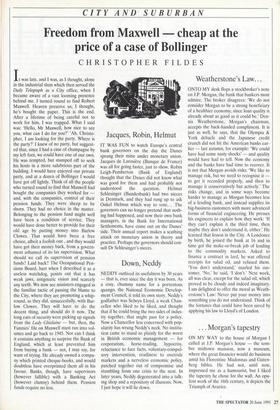CITY AND SUBURBAN
Freedom from Maxwell cheap at the price of a case of Bollinger
CHRISTOPHER FILDES
It was late, and I was, as I thought, alone in the industrial slum which then served the Daily Telegraph as a City office, when I became aware of a vast looming presence behind me. I turned round to find Robert Maxwell. Heaven preserve us, I thought, he's bought the paper. This is the end. After a lifetime of being careful not to work for him, I was trapped. What I said was: 'Hello, Mr Maxwell, how nice to see you, what can I do for you?"Ah, Christo- pher, I am looking for the party. Where is the party?' I knew of no party, but suggest- ed that, since I had a case of champagne by my left foot, we could have one of our own. He was tempted, but stumped off to seek his hosts in a more salubrious part of the building. [would have enjoyed our private party, and at a dozen of Bollinger I would have got off lightly. Think of all the people who turned round to find that Maxwell had bought the companies they worked for — and, with the companies, control of their pension funds. They were sheep to be shorn. They had no choice in the matter. Belonging to the pension fund might well have been a condition of service. They would have done better to provide for their old age by putting money into Barlow Clowes. That would have been a free choice, albeit a foolish one , and they would have got their money back, from a govern- ment ashamed of its lax supervision. What should we call its supervision of pension funds? Laid back? The Occupational Pen- sions Board, hurt when I described it as a useless watchdog, points out that it has weak jaws, astigmatic vision and scarcely any teeth. We now see ministers engaged in the familiar tactic of passing the blame to the City, where they are promoting a whip- round, as they did, unsuccesfully, with Bar- low Clowes. They will have to do the decent thing, and should do it now. The long ears of security were picking up signals from the Lady Ghislaine — but, then, the Funnies' file on Maxwell must run into vol- umes and go back to 1945. Nor can I think it contains anything to surprise the Bank of England, which at least prevented him from buying a bank — not, I may say, for want of trying. He already owned a compa- ny which printed cheque-books, and would doubtless have overprinted them all in his favour. Banks, though, have supervisors (however fallible) with a Banking Act (however clumsy) behind them. Pension funds require no less.


























































 Previous page
Previous page